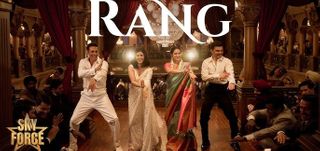
Yuva Hindi Movie Review
Abhishek Bachchan blossoms into a formidably engaging actor in this eagerly awaited work of popular art. "Yuva" is that rarity which can be watched both as an entertainer and a vehicle for projecting socio-political ideas.
The easiest thing in the world is to sneer at someone who attempts to be unconventional through conventional routes. In that sense, Mani Ratnam and Michael Mukherjee, his protagonist in his latest film, share the same predicament.
Like Ajay Devgan's fascinating character who wants to bring about a change in the social order, Ratnam's cinema signifies tremendous leaps in the way we perceive popular entertainment in this country.
A riveting blend of social message and entertainment is what sets "Yuva" apart. Like Ratnam's first Hindi film "Dil Se", "Yuva" is an extremely restless film about young characters who are on the lookout for a relevance to their existence.
While Michael wants to use student power to change the festering fortunes of Indian politics, the loutish Lallan (Abhishek Bachchan) just wants a decent life for his wife Shashi (Rani Mukherjee) and himself, and never mind if it's through indecent means.
The third and most blithe spirited protagonist, Arjun (Vivek Oberoi), is a commitment-phobic self-seeking wannabe whose plans of making millions in the US go flat when he meets the mesmerising girl-next-door Meera (Kareena Kapoor)
Each protagonist extends a fidgety power into the narrative.
Among the many absorbing facets to Ratnam's storytelling is the way he uses time passages in the lives of the various characters and the delightfully inventive modes of plotting, whereby different perceptions are simultaneously projected into the various characters' line of vision.
These are proof of a mind that creates cinema through literary devices.
You can almost read between the lines that Ratnam crosses from one protagonist's life into another. The effect is of sea waves lapping against the shore and receding to leave behind tempting tides of significance.
The three-tiered plot creates a sense of lyricism in the plot. Every character fits in the Kolkata milieu without stretching in the larger picture. Yet the existence of the binding cosmic force that keeps watch on Ratnam's world and the world beyond his creation, looms large over the narrative.
The gangster Lallan and his volatile blow-hot, blow-cold relationship with his wife Shashi echoes Manoj Bajpai and Shefali Chhaya's rapport in Ram Gopal Varma's "Satya".
But beyond that echo of familiarity is an aching originality in every frame, nurturing the characters through a remarkable process of self-discovery.
Unlike "Dil Se", whose narrative couldn't really hold the audiences, "Yuva" keeps us glued to the goings-on till the very end, not because it tells a remarkably original story but because the characters come alive here as complete people, full of little gestures and understated personality traits that we may miss at first.
"Yuva" is like a visit to a strange and warm tropical island. At first the sights and sounds may appear too familiar for excitement. But every shrub and every rock hides a new experience.
It's that subterranean experience that "Yuva" brings to the surface.
Ratnam goes from one level of characterisation to another, weaving in and out of three lives without creating an autonomous self-contained world for each protagonist. The men who tower over the plot are also the tools in the hands of destiny.
More than a film about ideas (so well conceived and executed you wonder why any other filmmaker didn't think of it) "Yuva" is a walloping entertainer.
It's simply impossible to forget the three protagonists and their mesh of karmic adventures. The romantic side to the political parable about a student leader, a hit man and a drifter is brought out so sharply in so little space, you wonder if economy of expression is Ratnam's mainstay.



















